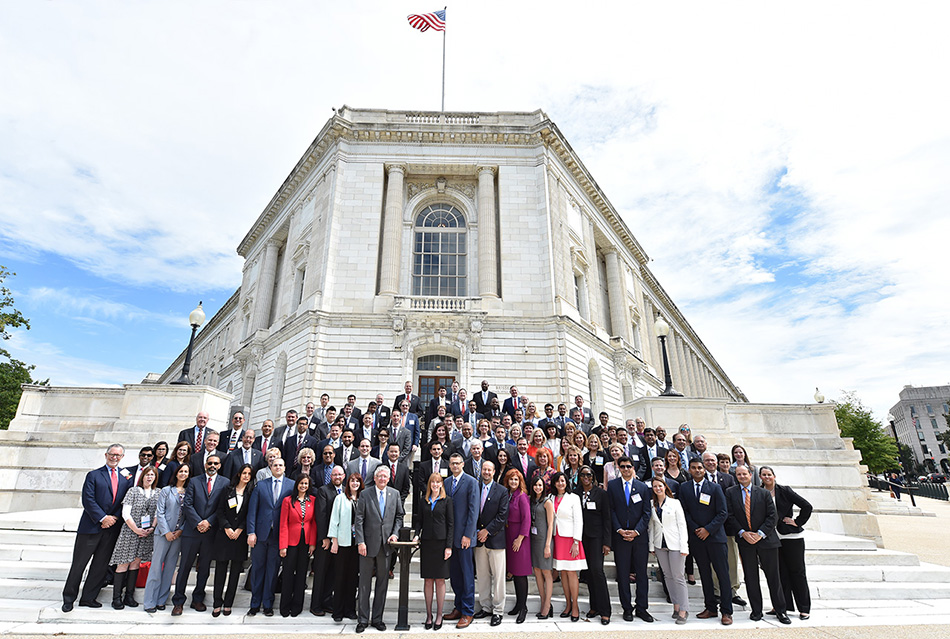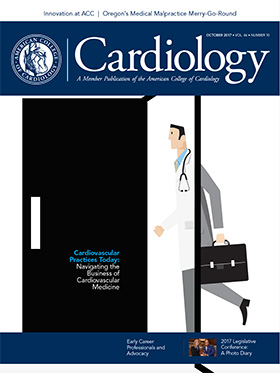Harold on History | ACC Legislative Conference: 26 Years of Making a Difference on Capitol Hill
"Today the eyes of all people are truly upon us – and our governments, in every branch, at every level, national, state and local, must be as a city upon a hill – constructed and inhabited by men aware of their great trust and their great responsibilities." — President John F. Kennedy, 1961
For ACC’s 26th annual Legislative Conference, nearly 400 cardiovascular professionals went to Capitol Hill to advocate for quality cardiovascular care and support continued research funding. Over the last quarter of a century, the ACC has brought together thousands of cardiovascular professionals to Washington, DC, to advocate for policies that support patients, providers and practices.
James S. Forrester, MD, FACC, and I found while writing ACC’s 65th anniversary book titled The Past is Prologue, many of the broad challenges affecting the College and its members today are remarkably like those faced since our founding. The same can be said for the broad advocacy challenges we have faced over the years. The ACC’s advocacy efforts continue to be centered around building relationships with Congress, federal government agencies, state legislative and regulatory bodies, private insurers and other policy making groups to advance the College’s mission.
The College moved from New York City to Bethesda, MD, in 1965 — the same year that Medicare and Medicaid programs were established — to be closer to the National Institutes of Health and the nation’s capital. Soon after, the Government Relations Committee (now Health Affairs Committee) formed and the ACC assumed an active role with legislators, advocating for physicians and their patients, primarily in regard to research funding and health care coverage. The first Legislative Conference was held in 1999.
The move to the College’s current Heart House headquarters in Washington, DC, in 2006, reflected the changing political environment and the continued growth and expansion of the ACC. Heart House provides the College with a more accessible physical presence close to the center of the federal government, where research funding and patient access to quality care continue to be key areas of advocacy action. However, new challenges have also emerged. Changes in the practice environment (see cover story) and the ongoing transition from a fee-for-service reimbursement model to one focused on value and outcomes have brought new issues to the forefront. The Medicare Access and CHIP Reauthorization Act (MACRA) is the most recent and arguably the most important advocacy development since the creation of Medicare and Medicaid.
As a result of these changes, interest in ACC’s Advocacy agenda and subsequently the Legislative Conference itself has grown by leaps and bounds. In the last decade alone, attendance at the Legislative Conference has more than doubled and attendees have broadened to include not just ACC leaders, but Fellows in Training, Early Career Professionals, Emerging Advocates and the whole spectrum of cardiovascular care team members. The agenda has expanded to offer members of all types leadership training, insider information on the top policy issues facing cardiology and health care as a whole, and an opportunity to ensure lawmakers understand the critical roles cardiovascular professionals play in the lives of their patients and their communities.
The College’s current advocacy efforts are rooted in eight Health Policy Principles that outline the rules of engagement in response to ongoing legislative developments:
- Expand access to and prevent loss of health care coverage through public and private programs.
- Guarantee access to affordable coverage options for patients with cardiovascular disease or other pre-existing medical conditions.
- Improve access to and coverage of preventive care and expand the nation’s investment in research, prevention, public health and disease surveillance.
- Continue and build upon policies to promote usability and interoperability of health infomation technology to improve patient care and outcomes.
- Maintain commitment to patient-centered, evidence-based care and reverse the trends toward decreased personal contact between the patient and the physician/care team.
- Emphasize professionalism, transparency and the collaborative clinician-patient relationship to improve quality and promote better outcomes.
- Foster collaborative development, testing and expansion of models that promote and reward value, team-based care and shared decision making through the Center for Medicare and Medicaid Innovation and other entities.
- Minimize barriers to the delivery of efficient, high-quality cardiovascular care in all practice settings.
Engagement in advocacy is part of our professional accountability. As clinicians, we have a responsibility to be at the table advocating on behalf of our patients, our hospitals, health care systems and promoting public and population health. Understanding the complex political processes of federal and state governments can be daunting. When we advocate for our patients we are all on the same side despite the current partisan divide in politics.
There’s no doubt that ACC’s rich history in tackling Advocacy challenges will help the College in this next era of health care to improve heart health in a world where innovation and knowledge optimize cardiovascular care and outcomes. As President Theodore Roosevelt remarked, “The more you know about the past, the better prepared you are for the future.”
I hope to see you next September at the 2018 Legislative Conference!

Tweet this article: Tweet
 |
|
| Click the cover image above to read the latest issue of Cardiology in e-pub format or click here to read it on the web! | |
Clinical Topics: Cardiovascular Care Team, Diabetes and Cardiometabolic Disease, Dyslipidemia, Noninvasive Imaging, Prevention, Atherosclerotic Disease (CAD/PAD), Hypertriglyceridemia, Lipid Metabolism, Nonstatins, Novel Agents, Statins, Computed Tomography, Nuclear Imaging, Diet, Exercise
Keywords: ACC Publications, Cardiology Magazine, Coronary Artery Disease, Hydroxymethylglutaryl-CoA Reductase Inhibitors, Risk Factors, Vegetables, Triglycerides, Blood Glucose, Lipids, Lipid Metabolism, Ideal Body Weight, Blood Pressure, Cardiovascular Diseases, Body Mass Index, Antibodies, Monoclonal, Diet, Atherosclerosis, Life Style, Exercise, Inflammation, Agriculture, Cholesterol, Tomography, X-Ray Computed, Goals
< Back to Listings


